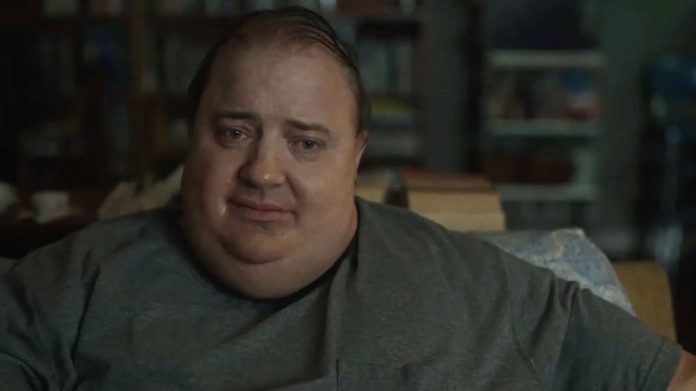Most people haven’t heard the name Samuel D. Hunter before, but those in the theater community are well aware of the man and his work — a significant amount of which has been produced in a relatively short amount of time, to great acclaim, no less.
Since 2010, Hunter has had over a dozen plays produced in New York City and become one of the most widely-produced American playwrights nationwide. His plays have a recurring idea about “the human experience and connection, through love, religion, and isolation,” and these plays are almost always filtered through the perspective of various denizens of the state of Idaho, where Hunter was born and raised. Additionally, Hunter is a MacArthur Fellowship (aka “Genius Grant”) recipient, and he was also a staff writer on the FX series Baskets.
One of Hunter’s earlier works, The Whale, had its New York City premiere at Playwrights Horizons in the winter of 2012. The award-winning production that I saw starred Shuler Hensley (The Greatest Showman) as the protagonist, Charlie, a reclusive English professor who’s desperate to reconnect with his daughter as his body begins to fail him as the result of over-eating.
After a nearly decade-long journey to the screen, the feature adaptation of The Whale is currently playing in theaters nationwide courtesy of A24. Directed by Darren Aronofsky, it features a fantastic performance by Brendan Fraser that many critics are raving about, putting him in position for a possible Oscar win.
Above the Line recently had the chance to sit down and talk to Mr. Hunter about adapting his own play for the screen, as well as the challenges and the rewards of his journey in bringing this tale to the big screen.
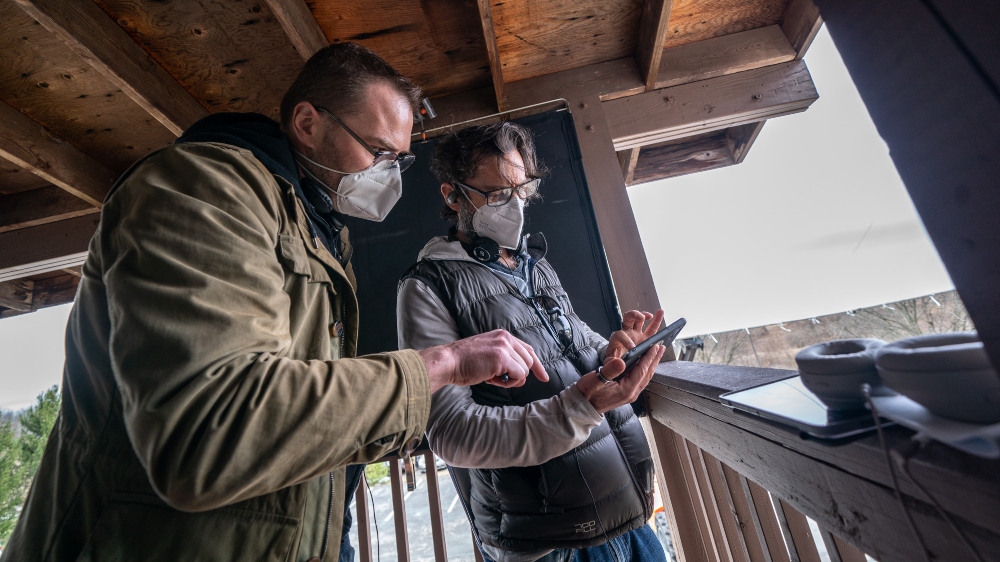
Above the Line: I know it’s been a really long journey to bring this story to the screen. How have people been responding to it, and how has it made you feel?
Samuel D. Hunter: Yeah, it’s crazy. It was actually 10 years ago, I think, to the day, that we closed at Playwrights Horizons today. So, it’s kind of an incredible thing to think that 10 years later, here we are. I mean, what’s been so nice is, now that paying audiences are seeing it, I’m getting to talk to non-industry people. We did a screening at the Hammer Museum in Los Angeles last week, or the week before, I forget. And I ended up hugging, like, five strangers, just because they felt something [while watching] the film or connected to it in a personal way. And they wanted to express that to me. So that’s been, like, the best part. I mean, that was the best part of the play, too.
ATL: I don’t know how many other press people you’ve been talking to who actually saw that production in New York 10 years ago.
Hunter: Not that many.
ATL: It was my first opportunity to experience your work. I’ve been waiting a really long time to see this make it to the big screen, and I enjoyed it. As someone adapting their own work, what were some of the biggest challenges in turning The Whale into a movie?
Hunter: In a way, I’m kind of glad it took 10 years because it was a hard needle to thread. I think, early on, when I was talking with Darren about it, I expected that he would want me to open it up and add new characters and have other settings and storylines and stuff. And just every time I tried to think that way, it just didn’t work. I just couldn’t figure it out. I think other plays [of mine] could be opened up in that way. But, like, this one is just… you just want to be with this person. Like, that’s the whole deal — you just want to spend time with this human being and commune with this guy.
And early on, Darren, without me saying anything, said, ‘let’s keep it in the apartment.’ So then I think the challenge was, ‘okay, what’s the cinematic language here? And also, can we find a cinematic language but can we also not apologize for the fact that it is sourced from a stage play?’ in much the same way that the film version of Who’s Afraid of Virginia Woolf? does not make any apologies for the fact that it’s a play.
For example, Charlie’s big monologue in the play about his lover who passed that he says to Thomas… that’s not in the film. And instead, I created this second bedroom in his apartment that’s the archaeology of his relationship with Alan so you know all of that exposition, for lack of a better word, happens silently, with Charlie trying to open the door and [us] seeing inside, [and] seeing this life that he had. So it was a lot of things like that along the way, a lot of small discoveries that led to finding what the cinematic language could be.
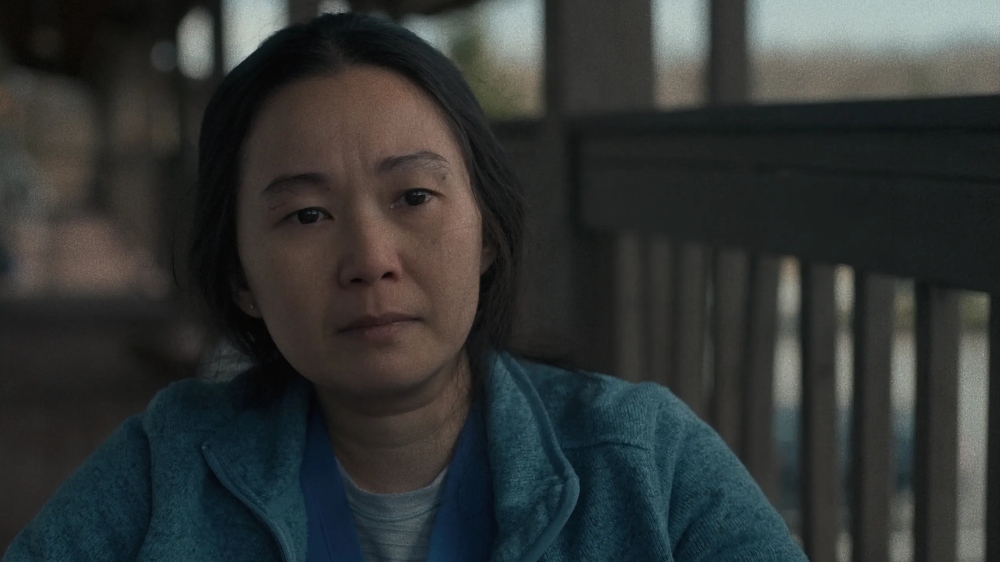
ATL: I saw that there had been a couple of drafts of the screenplay. What do you feel changed the most from the first draft of this to what ultimately ended up on the screen? Or were there more minor adjustments here and there?
Hunter: So, for a first draft, when we decided, ‘okay, let’s keep it in the apartment,’ I was like, ‘Okay, I’m not going to apologize in this first draft about the scenes being incredibly dialogue driven.’ So I was finding small things. But I was like, ‘this isn’t this, this is a starting place where we can start to find what is needed, what is not needed, [and] what else it wants.’ I’d have to count the [number] of drafts on my hard drive over the past decade, but it’s a mountain of them. And it never changed in terms of its story structure. But the way the story got told went through many, many different evolutions.
ATL: I think one of the interesting things in the film version, versus the play, which is essentially set in 2012, is that the film is very specifically set during the 2016 primary elections. I’m wondering where that choice came from and how that kind of heightened some of the points of the story that you were trying to make.
Hunter: I mean, the funny thing about our present moment is, we’ve all been through this massive isolation. And we’ve all been taking classes on Zoom. And so it’s weird that the idea of teaching online was such a theoretical thing back then, [that] it was actually, for some people, a point of confusion. They’d be like, ‘What? He teaches them on a computer?’
But to more directly answer your question, when I first started developing it as a screenplay in 2012, I think I just set it in 2012. Because I was like, I think this is modern day. But by the time, you know, we did a reading of the screenplay with Brendan, that was the moment that we were like, ‘Oh, my God, I think we can make this movie,’ and then a week and a half later, the pandemic hit. And so we built this thing and shot this thing in the middle of COVID. And during that, as I was getting into the script more deeply with Darren, as we were heading to production, the idea of when it was set came up. Because 2012 seems a little arbitrary at this point. And we didn’t want it to be set during the pandemic, because that would just be a thing in the story. People would be wearing masks, especially Liz (Hong Chau) as a healthcare worker.
And so we chose 2016, because I feel like the world was on the sort of precipice of something, of this drastic change, or the country, maybe, more specifically, was on the precipice of this drastic change. And I think all five of these characters are on a similar precipice. And so I really liked, when you hear this stuff about Super Tuesday in Idaho, how it places it in this larger context that kind of led to our present moment.
ATL: For me personally, the thing I kept hearing in the back of my head while watching this film was something that people said a lot during Trump’s presidency, which is “the cruelty is the point.” I don’t know if that was intentional or not, but it kind of puts in the background this feeling, where in the foreground, you have a lot of characters saying pretty hurtful things to each other, not necessarily because they’re trying to hurt each other, but because that’s their defense mechanism. I’m wondering if there was any intention about using the specificity of that moment in 2016 where, quote, the “rise of these feelings” in the country was about to occur. Or maybe I’m just adding my own subtext to it.
Hunter: No, no, no, no, no, you’re right on track. And it’s something that I love the way you’re talking about it. There aren’t a lot of people talking about it that way, the way that I’ve been kind of framing it, [which] is sort of like that precipice that we were on in 2016. We were about to, you know… moving beyond Trump, because Trump is a symptom of the larger disease, but we’ve moved into such a cynical era where we don’t trust one another. We are very isolated. We’re tribalistic. And Charlie, as a human being, is kind of anything but that, [and] the way that I’ve wanted to conceive him is like an antidote to all of that cynicism, and his steadfast belief, that faith in other people, is something worth fighting for.
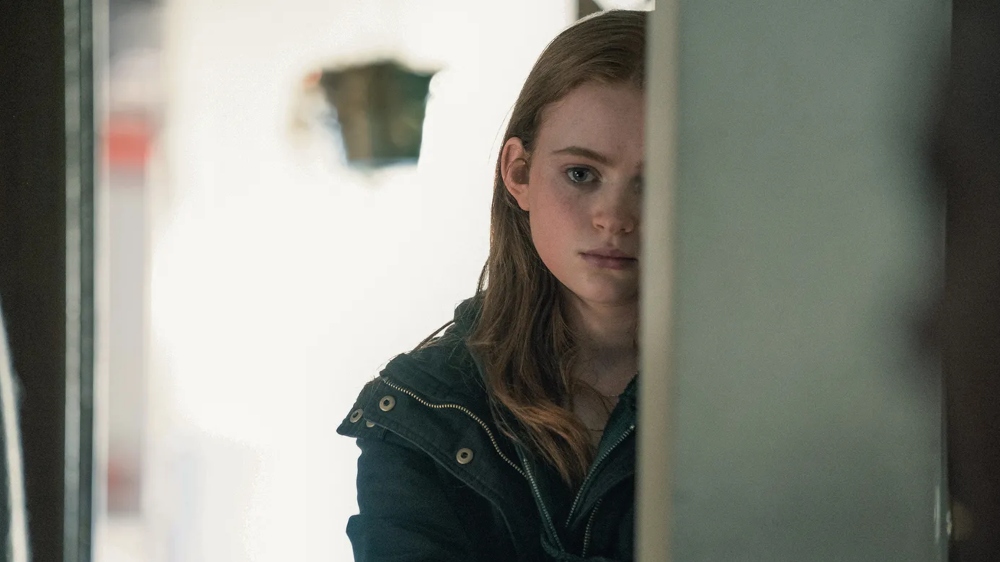
ATL: I think, for me, it further brought out Charlie’s humanity. With everything else going on in the background and the foreground, it just heightened his belief that even though he’s sitting there watching what may be about to happen in the country, he still believes that it’s impossible for people not to have any good intentions inside themselves.
Hunter: That’s right.
ATL: In the time between when the play was produced and now, you became a father. This is very much a story about a father and a daughter. How did becoming a parent yourself impact the way that you looked at telling this story now, all these years later?
Hunter: I mean, [I’m] a parent to a daughter, specifically. I mean, my kid is five, so we’re still kind of in the little kid phase. So we haven’t met anything too difficult beyond tantrums and things like that. I think the biggest thing was writing a character who hadn’t seen his daughter for several years and had sort of left her behind, but sort of had been forced from being around her. That was all theoretical to me back then. But thinking about that now, it is overwhelming. Thinking about that incredibly tragic choice between being with the person that you love, your romantic partner, the love of your life, and having that be in direct opposition to the love of your child. I mean, it’s so, so tragic.
Not to get too pretentious, but Hegel’s definition of tragedies [centers around] two noble forces that can’t coexist. And I think that Charlie’s fundamental tragedy is the love of both Alan and Ellie, because things beyond his control were things that couldn’t coexist. So I think, in conceiving that story, it just emotionally deepened it for me a lot. And I felt Ellie’s injury so much more acutely than I did when I first wrote the play.
ATL: You bring up injured characters, I think the film, for me, really brought certain things into focus regarding the character of Liz. Where does Liz’s position come in terms of the enablement of Charlie’s behavior? On one hand, she’s a nurse, and a nurse’s responsibility is the health of their patient. But she’s also essentially enabling the other side of Charlie, which is, the bad eating habits. What is the impetus of that behavior?
Hunter: I think that for Liz, Charlie is many, many things, but he’s also the kind of corporeal manifestation of the death of her brother and that tragedy, and I thought a lot about, when I was both writing the play and the screenplay, [how] 10 years ago, they were probably great. Brendan makes a joke that they would play Pictionary together. And I think he’s right. I think, like, when Alan was still around, and when Liz was coming by, I think they had a great time and would have pizza together and that comfort food, and things that Charlie really loved. And so I think by bringing him this food, it’s like calling back to this much better era. And I think, on some level, she knows what she’s doing.
But for all of these characters, the story is all about confronting deep truths that you don’t want to confront. And I think it’s not until the final scene that Liz confronts that part of herself and says, ‘I don’t know what I’m doing.’ So many people are in codependent relationships. The psychology is so complicated that they can at once be aware of it, but also participate in it.
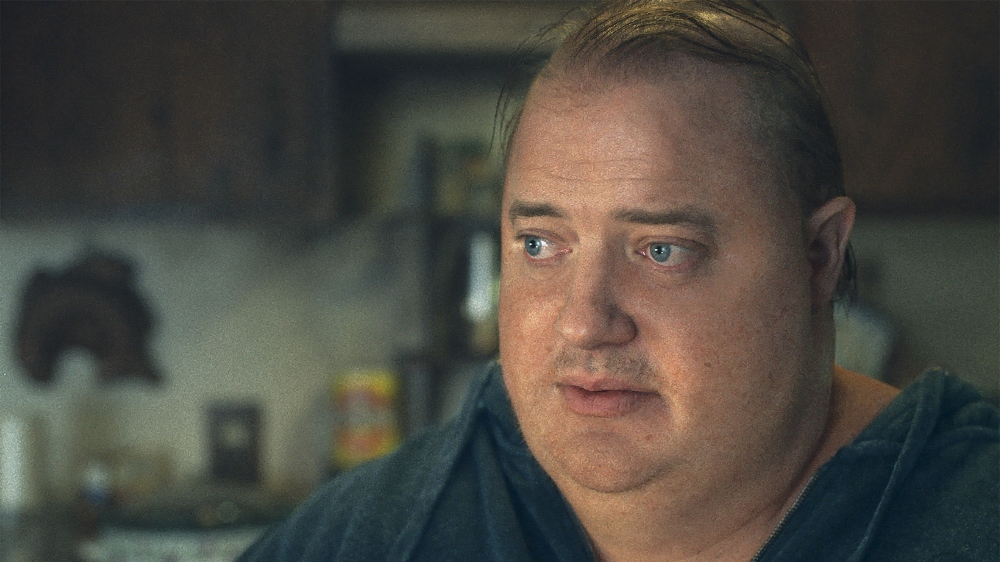
ATL: There’s been a lot of conversation about how the film addresses overweight individuals. It’s been spoken about at length in other interviews. However, something I’d love to hear you speak more about is what the film is trying to say about our relationship to food, and emotional binge eating, and how that’s tied to the story of Alan and Charlie. I’m curious what you think as both the writer and as someone who had their own challenges with weight when they were younger.
Hunter: I think it’s a really complicated subject. I mean, I never wrote the play thinking, “here’s my statement,” you know? I’ve never been “here’s the socio-political message that I’m trying to send out,” either. “Here’s my broad statement that I’m making about this thing right here.” I’ve always just focused on character. These are five very specific people in a very specific situation. I mean, Charlie is a lot of things and one thing that he is, is a man who struggles with his weight, and I put that in, for the most part, because I would eat as a kid — both as a kid, and then as an adult who had not gone into proper therapy and not processed some painful things.
As a gay person in the world, and a person who was desperately trying to reconcile his sexuality with his faith, the way that manifested in me, personally, was using food as comfort and self-medication. And so that’s really where it came from. So as far as what larger statement it’s making, people bring their own stuff to it. Do you know what I mean? People are bringing a lot of their own subjectivity to it. And I just told the story.
ATL: Sure. I think for me, it’s very specifically how Alan essentially starved himself to death and Charlie has decided that he’s going to eat and cause these behaviors that essentially lead him to eat himself to death. And I was just interested in the duality of those ideas and the motives of two people. It’s this interesting, representational yin-yang for the wrong reasons, if that makes sense.
Hunter: Yeah. It’s a little bit more nuanced in the screenplay. Because Alan, in this screenplay, commits suicide — he jumps off a bridge. But Liz, there is a key line in one of the later scenes where Liz talks about trying to take care of Alan, she was begging him to eat something. And so, I think that speaks to her enabling behavior [and] speaks to the way that she tries to demonstrate love.
For both of them, I think Alan has not been properly laid to rest. And I think that we’ve seen that duality is really wrapped up in it, because by bringing food to Charlie, she’s in some way caring for her brother in a kind of complicated way. And I think Charlie is a man who has made the decision, ‘I’m just going to make money for Ellie,’ and the only comfort he allows himself is food.
(Major spoilers ahead concerning the end of The Whale)
ATL: I appreciate your insights on all of that. Let’s talk about the very end of the movie. It does differ in one interesting way from the stage version. It pretty much plays out the same — Charlie gets up, he starts walking, and in the production I saw, there’s a very sudden blackout, the implication being that Charlie has left this plane of existence. The movie very much visually puts forth the idea that Charlie has died and ascends to, let’s call it heaven. Or perhaps the beach he so fondly remembers? Whatever that next realm may be. What was behind the decision to make that more of an explicit idea?
Hunter: Yeah, that was all Darren, and I really respected it. The way that the play ends becomes kind of otherworldly, both because of what’s happening on stage, but also because I wrote that the sounds of waves are starting to come and build and build and build and build. And so it kind of starts to hover over the surface of realism a little bit. And I think when I wrote the screenplay, I had those waves come in and you do hear waves in the movie, but Darren took it to this whole other level.
And what I love about it is — I’ve always talked about this — the end of the movie being an apotheosis, even back when we did the play, when it was just blackout. But I love [the] idea that Charlie conquers death in such a bold way in the final moments of the film. And also, it kind of leaves it open to this beautiful interpretation of what exactly is that moment.
ATL: As someone who has seen a wide variety of your work on stage, I’m curious which one of your other plays you’d like to turn into a movie and why.
Hunter: Oh my gosh, I’ve thought about that. There is actually a play that I have developed into a screenplay. But I had trouble finding anybody who wanted to give me the money to do it. I hesitate to say what it is but I definitely am interested in that now. Because having seen it done, and done with such integrity, and having had such a great experience, and also having been able to be on set the entire time working with everybody consistently… I had a masterclass in filmmaking watching Darren make this film. So it’s definitely whetting my appetite but I’m not exactly sure what that means. I’m just kind of on the ride at the moment.
The Whale is now playing in theaters nationwide courtesy of A24.


